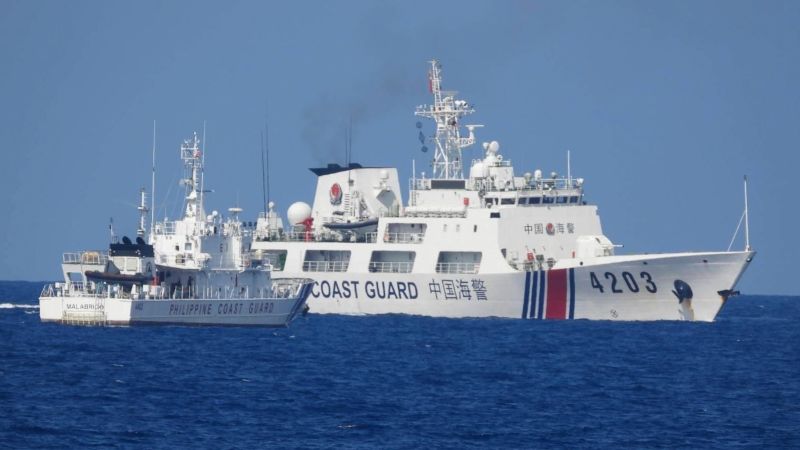Chinese Coast Guard Accused of Aggressive Actions in South China Sea
The Philippines has accused Chinese Coast Guard ships of engaging in dangerous maneuvers and firing water cannons at its ships in the South China Sea. The Philippine Coast Guard (PCG) strongly condemned these actions, stating that they were illegal and posed a threat to their vessels. The incident occurred as PCG vessels were escorting ships carrying supplies to military troops stationed in Ayungin Shoal, also known as Second Thomas Shoal. China, on the other hand, accused the Philippines Coast Guard of trespassing in its waters.
Tensions in the South China Sea
The South China Sea has long been a source of tension between the Philippines and China. Beijing claims almost all of the 1.3 million square mile South China Sea, including the Spratlys, an archipelago consisting of 100 small islands and reefs. However, the Philippines, Malaysia, Brunei, and Taiwan also claim full or partial ownership of these islands. Manila refers to the area as the West Philippine Sea and has taken measures to enforce its claim, such as grounding a navy transport ship on Second Thomas Shoal.
International Support for the Philippines
The United States State Department has voiced its support for the Philippines and called on China to respect the freedom of navigation in the South China Sea. The US maintains that China has no lawful claim to the maritime area around Second Thomas Shoal. This incident highlights the ongoing tensions and territorial disputes in the region.
Future Prospects for Resolution
Despite the strained relations, Chinese leader Xi Jinping and Philippine counterpart Ferdinand Marcos Jr. recently met and agreed to strengthen economic ties and resume talks on oil exploration in the South China Sea. This indicates a potential willingness to find a peaceful resolution to the disputes in the contested waterway.
Conclusion
The recent incident between the Chinese and Philippine Coast Guards in the South China Sea highlights the ongoing tensions and territorial disputes in the region. Both sides have accused each other of trespassing and engaging in aggressive actions. The international community, particularly the United States, has expressed support for the Philippines and called on China to respect freedom of navigation. The meeting between Xi Jinping and Ferdinand Marcos Jr. offers hope for future dialogue and potential resolution of the disputes.
Title: Philippines Accuses China of Provocative Water Cannon Attacks in South China Sea
Introduction:
The territorial disputes in the South China Sea have long been a contentious issue, with multiple nations claiming sovereignty over various islands and maritime areas. In the latest development, the Philippines has accused China of engaging in provocative water cannon attacks in the disputed region. This article aims to shed light on the escalating tensions between the two nations and the potential implications for regional stability.
Background:
The South China Sea, a strategically vital waterway, is claimed in part or in whole by China, the Philippines, Vietnam, Malaysia, Brunei, and Taiwan. These overlapping territorial claims have led to frequent confrontations and diplomatic disputes. China, in particular, has been assertive in asserting its claims, constructing artificial islands, and deploying military assets in the disputed waters.
The Accusation:
The Philippines, through its Department of Foreign Affairs, has accused China of conducting provocative water cannon attacks against Filipino fishermen in the vicinity of Scarborough Shoal. The incidents allegedly occurred on multiple occasions, with Chinese coast guard vessels reportedly using water cannons to drive away Filipino fishing boats from the area. These actions are seen as a violation of the United Nations Convention on the Law of the Sea (UNCLOS) and an infringement on the Philippines’ sovereign rights.
Implications for Regional Stability:
The Philippines’ accusation against China raises concerns about the potential escalation of tensions in the South China Sea. Such provocative acts risk undermining the already fragile regional stability and could potentially lead to more serious confrontations. The use of water cannons against unarmed fishermen is not only a violation of international law but also a threat to the livelihoods of those dependent on fishing in the region.
International Response:
The international community has been closely monitoring the situation in the South China Sea, urging all parties to exercise restraint and resolve disputes through peaceful means. The United States, a key ally of the Philippines, has expressed concern over the reported water cannon attacks and reiterated its commitment to upholding freedom of navigation in the region. Other countries, including Japan and Australia, have also voiced their concerns and called for a peaceful resolution to the disputes.
Diplomatic Efforts:
The Philippines has lodged a diplomatic protest against China, demanding an immediate halt to the provocative actions and the respect of its sovereign rights. The country has also sought the support of other nations in condemning China’s behavior and urging it to abide by international law. The Association of Southeast Asian Nations (ASEAN) has been actively involved in facilitating dialogue and promoting a Code of Conduct in the South China Sea to manage disputes and prevent further escalation.
Conclusion:
The Philippines’ accusation against China regarding the provocative water cannon attacks in the South China Sea highlights the ongoing tensions in the region. The incidents not only violate international law but also pose a threat to regional stability. It is crucial for all parties involved to exercise restraint, engage in peaceful dialogue, and adhere to international norms and agreements. The resolution of these disputes should prioritize the preservation of peace, security, and the well-being of the people living in the region.









